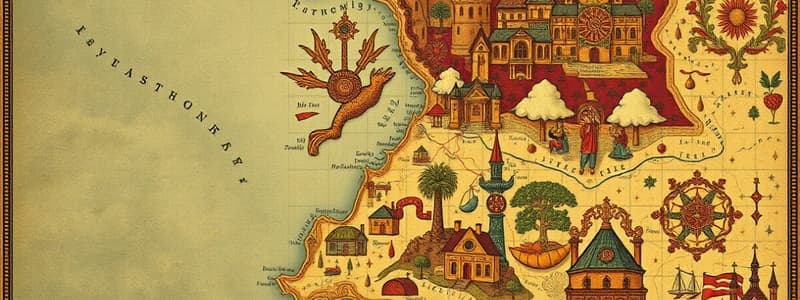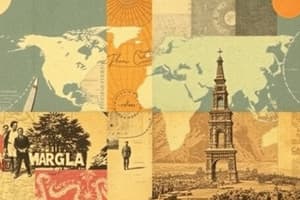Podcast
Questions and Answers
What is a significant feature of the Alps mountain range?
What is a significant feature of the Alps mountain range?
- They separate France from Spain.
- They provided protection to Rome during the Roman Empire. (correct)
- They extend solely within Italy.
- They are the highest mountains in Europe.
What was the original name of France?
What was the original name of France?
- Gallia
- Gaul (correct)
- Roman Gaul
- The Frankish Kingdom
Which body of water connects the Atlantic Ocean to the Mediterranean Sea?
Which body of water connects the Atlantic Ocean to the Mediterranean Sea?
- Adriatic Sea
- Strait of Gibraltar (correct)
- English Channel
- Aegean Sea
What triggered the rise of Christianity in Europe?
What triggered the rise of Christianity in Europe?
What major societal advancement occurred during the Dark Ages?
What major societal advancement occurred during the Dark Ages?
What is the main purpose of the Global Positioning System (GPS)?
What is the main purpose of the Global Positioning System (GPS)?
Which tool integrates map data with other kinds of information?
Which tool integrates map data with other kinds of information?
What is the primary function of map scale?
What is the primary function of map scale?
What does a continent refer to?
What does a continent refer to?
In what order should you locate a place on a world map?
In what order should you locate a place on a world map?
What does the International Date Line signify?
What does the International Date Line signify?
What was one of the earliest forms of geography?
What was one of the earliest forms of geography?
What type of phenomena do geographers study?
What type of phenomena do geographers study?
How many primary time zones are there on Earth?
How many primary time zones are there on Earth?
What is the role of the International Date Line?
What is the role of the International Date Line?
Which type of mountain is formed by tectonic plate collision?
Which type of mountain is formed by tectonic plate collision?
What are the characteristics of upwarped mountains?
What are the characteristics of upwarped mountains?
Which mountain range contains the highest peaks on Earth?
Which mountain range contains the highest peaks on Earth?
What is a characteristic of volcanic mountains?
What is a characteristic of volcanic mountains?
What is a key feature of the Appalachian Mountains?
What is a key feature of the Appalachian Mountains?
What process is responsible for the formation of fold mountains?
What process is responsible for the formation of fold mountains?
Which of the following is not a type of mountain mentioned?
Which of the following is not a type of mountain mentioned?
What natural resource is extracted from the forests of the Appalachian Mountains?
What natural resource is extracted from the forests of the Appalachian Mountains?
What is the primary feature that the Andes mountains have that contributes to fertile soil?
What is the primary feature that the Andes mountains have that contributes to fertile soil?
Which mountain range is the highest point in the world?
Which mountain range is the highest point in the world?
What are the main components of Mount Kilimanjaro?
What are the main components of Mount Kilimanjaro?
What natural occurrences contributed to the formation of the Rocky Mountains?
What natural occurrences contributed to the formation of the Rocky Mountains?
Which river is considered the longest river in Europe?
Which river is considered the longest river in Europe?
What is a significant environmental challenge faced by the Andes region due to increased tourism?
What is a significant environmental challenge faced by the Andes region due to increased tourism?
What climatic condition affects wildlife above 12,000 feet on Mount Kilimanjaro?
What climatic condition affects wildlife above 12,000 feet on Mount Kilimanjaro?
What distinguishes the Atlas Mountains compared to older mountain ranges?
What distinguishes the Atlas Mountains compared to older mountain ranges?
What is Denali's height in feet?
What is Denali's height in feet?
Which mountain is known for having fixed ropes used by climbers?
Which mountain is known for having fixed ropes used by climbers?
Flashcards are hidden until you start studying
Study Notes
Geography Overview
- Geography integrates natural and social sciences, studying both Earth's physical features and human societal aspects.
- Cartography, or map-making, is an ancient practice dating back at least 4,300 years to Babylonian clay tablets.
- The Mercator projection, developed by Gerardus Mercator in 1570, remains prevalent, representing natural and man-made features on maps.
- GPS (Global Positioning System) utilizes satellites and radio signals to determine locations, simplifying navigation for users.
- GIS (Geographic Information System) enhances GPS data for effective communication and sharing of location-based information among researchers.
Map Scale and Locations
- Map scale shows the relationship between distances on a map and actual distances on the ground, typically found in a corner of the map.
- A systematic approach is used to locate places: identify the continent, country, and state or county before pinpointing the exact location.
Time Zones and the International Date Line
- The International Date Line, located at the 180-degree longitude, marks where one date transitions to another, connecting to time zone divisions.
- Time zones are divided into 24 segments, each covering 15 degrees of the Earth's circumference, established circa 1900.
Relief Maps and Terrain Representation
- Relief maps illustrate elevation and depression through color schemes, with blue for water, green for low areas, and brown for high elevations.
- Shaded relief maps provide a three-dimensional appearance through varied color and shading to represent terrain features.
Mountain Types and Formation
- Mountains are categorized into upwarped, volcanic, fault-block, and folded types based on formation processes.
- Erosion plays a significant role in shaping mountains and creating valleys.
- Types of mountains:
- Volcanoes: Form from magma erupting through the Earth's crust.
- Fold Mountains: Created by tectonic plates colliding and pushing up crust.
- Block Mountains: Result from large rock blocks being uplifted.
- Dome Mountains: Formed by magma pushing rock into dome shapes beneath the surface.
Major Mountain Ranges
- Major mountain ranges include:
- Himalayas: Home to the tallest peaks, including Mount Everest.
- Andes: Longest mountain range spanning seven countries in South America.
- Karakoram: Linked to the Himalayas, housing K2, the second-highest mountain.
- Rocky Mountains: Stretching over 3,000 miles in North America.
- Alps: Renowned European mountain range.
- Appalachian Mountains: Extending 1,500 miles from Canada to Alabama.
- Himalayas grow approximately 1-2 inches annually due to tectonic activity.
Mount Everest and Notable Climbers
- Mount Everest, at 29,029 feet, is the highest mountain globally, posing significant climbing challenges.
- Edmund Hillary and Tenzing Norgay were the first to summit Everest.
- Fixed ropes aid climbers in ascent, which typically takes about two months.
Cultural Geography of Spain
- Spain is located in southwestern Europe, primarily Catholic with Spanish as the main language, along with four regional languages.
- Influential historical periods include Roman and Moorish rule that shaped Spain's culture, which features culinary delights like paella and tapas.
European Geography Highlights
- The Alps and Pyrenees serve as significant mountain ranges in Europe, providing natural barriers and preserving cultural heritage.
- The historical significance of the Dark Ages, marked by societal advancements despite adversity, is essential in understanding European history.
Landforms and Natural Features in Europe
- Landforms include various mountains, valleys, canyons, lakes, and rivers, with notable geographical features like the Alps and Europe's longest river, the Blue Danube.
- Important European rivers: Danube, Rhine, Rhône, and Oder, with tributaries contributing to their significance in trade and transportation.
Studying That Suits You
Use AI to generate personalized quizzes and flashcards to suit your learning preferences.




